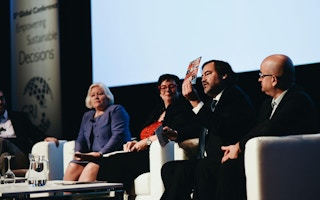The second day of the GRI 5th Global Conference saw new partnerships forged in mining data for sustainability and a role for both the private and public sectors in meeting development goals.
To continue reading, subscribe to Eco‑Business.
There's something for everyone. We offer a range of subscription plans.
- Access our stories and receive our Insights Weekly newsletter with the free EB Member plan.
- Unlock unlimited access to our content and archive with EB Circle.
- Publish your content with EB Premium.
The amount of information generated by businesses and governments worldwide is currently underused, and for innovation in sustainability to take place, this information needs to be liberated and organised in a way that can be analysed, said Global Reporting Initiative’s (GRI’s) chief executive Michael Meehan.
To this end, the non-profit organisation behind one of the most widely-used sustainability reporting frameworks announced last Thursday its newest technology initiative, the Digital Reporting Alliance.
It will address two key challenges in sustainability reporting: the lack of structured data and the lack of demand for digital reporting, by creating the technical infrastructure for digital reporting and a platform for filing digital reports, said the Amsterdam-headquarted GRI.
The founding of the alliance coincides with the release of the first set of exposure drafts of GRI Sustainability Reporting Standards which are now available for public comment.
“There is overwhelming public and private sector demand for GRI to provide this data so that these organisations can develop innovative solutions,” said Meehan.
During a plenary session on how the UN’s Sustainable Development Goals (SDGs) intersect with the role of the private sector, attendees were reminded of the vast power that the world’s largest companies wield, which rival those of nation states.
Whether it be in promoting gender equality in hiring, responsible consumption and production, or making responsible decisions that affect the climate, the private sector influences the outcome of many of the SDGs.
“Businesses here play a crucial role. I think the private sector can do so much more to create revenue, jobs, etc. – it can move quicker and move smarter than many other actors,” said Elisabeth Dahlin, Secretary General of Save the Children Sweden.
But governments should not view their role as purely legislative. Dante Pesce, Chair of the UN Working Group on Business and Human Rights, pointed out: “The number one economic entity in the world is the ‘state’ itself as an economic actor.
“Owner of companies, shareholder of companies, owner of pension funds, owner of sovereign wealth funds, and the largest supply chain in any given country in all the world is the ‘state’ as a procurer,” he added.
While it can be argued that sustainable development is the responsibility of both private and public actors, all panelists agreed that organisations benefit from collaborations between actors.
Ernesto Ciorra, Head of Innovation and Sustainability at Enel, a multinational power company operating in 30 countries, shared how his organisation considers innovation a key requirement for sustainability, and that true innovation must be cultivated by reaching outside of the orgnisation. At Enel, they partner with other companies, start-ups, schools, non-profits government and customers.
For example, at the 21st UN Conference on Climate Change, Enel and Nissan announced a partnership - with trials already underway - that allows electric vehicles to be fully integrated into the electric grid to store and release green energy based on demand needs versus renewable energy peak generation.
As a sign of the importance of integrating business disclosures with government policy, GRI and the Danish Institute for Human Rights (DIHR) last Thursday also separately announced a new partnership to enable business and government action to improve human rights around the world.
GRI and DIHR will collaborate to promote sustainability reporting as part of governments’ ongoing development and implementation of nation-specific action plans to address the objectives set out by the UN SDGs, particularly as it relates to businesses and human rights.
The two organisations will also promote human rights reporting under the 2030 agenda as a way to make the link between the UN SDGs and human rights.
The two organisations already boast a 15-year relationship. By signing the agreement, Teresa Folgelberg, Deputy Chief Executive at GRI, said the collaboration will now be “formalised for the next 15 years”.
Eve Grambye, Deputy Executive Director at the DIHR, explained that the agreement will help the DIHR analyse GRI data about business organisations to “tell the story that we are convinced is true - that human rights are not only about responsibility and about ‘do no harm’, human rights are also about opportunity.”

















